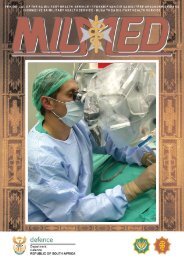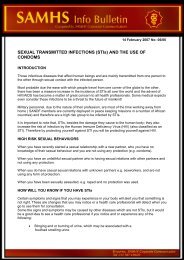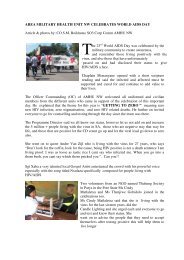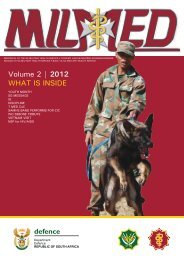MilMed Jan Feb 2007.qxp - SA Military Health Service
MilMed Jan Feb 2007.qxp - SA Military Health Service
MilMed Jan Feb 2007.qxp - SA Military Health Service
Create successful ePaper yourself
Turn your PDF publications into a flip-book with our unique Google optimized e-Paper software.
NEWS CLIPSNEWSNEWS CLIPSNEWS CLIPS NEWS6Violence Against WomenVOA\News\William Eagle"Stepping Stones” Helps End Violence Against Women inSouth Africa”The project, called Stepping Stones, was originally a seriesof workshops with men and women in separate groupsdiscussing, among other things, HIV/AIDS and safer sex.However, Stepping Stones also addresses gender issues inrelationships and has brought a reduction in violenceagainst women. The program began in Uganda but wasadapted for South Africa by Professor Rachel Jewkes, thedirector of the Gender and <strong>Health</strong> Research Unit at SouthAfrica’s Medical Research Council. Jewkes said: “There’s aproportion of men who use violence and feel uncomfortableabout it, and there’s a proportion of men who have notreally given thought to whether what they are doing is rightor wrong. And I think that putting forth the position that thisis something that is not acceptable is helpful.” Jewkes sayspopulation studies in South Africa show about 25 percent ofall women may have been beaten by their boyfriends orhusbands, and that about 10 percent were beaten in the lastyear. Other estimates say as many as half of all women mayhave been assaulted. Jewkes says violence is seen as ameans of male control over women among all races.AIDS DrugsThe Wall Street Journal Europe\News\Anita Greil“Roche gives HIV drug expertise to 3 African firms”Swiss drug maker Roche Holding AG said it will providethree African companies with the technical expertise tomanufacture a generic version of its HIV medicine Invirasefree of charge. Roche, based in Basel, Switzerland, said itwill transfer the technology to Aspen Pharmacare HoldingsLtd., based in South Africa, and to Cosmos Ltd. andUniversal Corp., both of Kenya. The companies will be ableto produce Invirase for supply throughout Kenya and SouthAfrica, in addition to any country within sub-Saharan Africaor defined as "least developed" by the United Nations.Invirase, also known by the generic name Saquinavir, is partof a group of drugs called protease inhibitors, which workby blocking the reproduction of the human immunodeficiencyvirus by disabling the crucial protease enzyme.Roche said the program allowing production of Saquinavirwould eventually extend to 25 companies in 14 countries.Orphans and Vulnerable ChildrenSomaliNet\News\South Africa“Food Aid for Vulnerable Children”Islamic Relief South Africa will implement its food aidprogramme in Soweto, south of Johannesburg, as part of itsOrphans and Vulnerable Children (OVC) campaign. Thebeneficiaries are three "Soul Buddyz" clubs who will receive300 food parcels from Islamic Relief during a function atNkholi Primary School in Pimville, and mentions that SoulBuddyz clubs are part of Soul City Institute for <strong>Health</strong> andDevelopment Communication, a dynamic and innovativemulti-media health promotion and social change project.Islamic Relief is an international relief and developmentNGO founded in the UK in 1984 with branches in35 countries, having consultative status with the Economicand Social Council of the United Nations. As well asresponding to disasters and emergencies, Islamic Reliefpromotes sustainable economic and social development byworking with local communities, regardless of race, religionor gender.HIV and AIDSMedIndia.com\News“Rise in Use of Female Condoms in South Africa”The use of female condoms appears to be rising in SouthAfrica, which has become its second largest market in theworld. South Africa has among the highest incidence ofHIV/AIDS globally, and the use of female condoms forms afocal point of government's national programme of ABC(abstinence, be faithful, condomise), with distributionincreasing from 1.3 million in 2001/02 to 2.6 million in2004/05. For 2005/06 the target was to distribute threemillion female condoms. Mags Beksinska, ExecutiveDirector of the Reproductive <strong>Health</strong> and HIV Research Unitat the University of Witwatersrand, said, "I believe that itsphased introduction over the years has gained momentum”.Beksinska said that measurement of the impact of femalecondoms in the country was difficult because these changesneeded to be measured in protected sex acts. Figures haveshown that in South Africa one in four women are HIVpositive by the age of 24, which is twice the infection ratefor men. According to Beksinska the introduction of a newmethod of protection takes several years for generalacceptance, and as a method available it has becomeknown by over half of women of a reproductive age.







